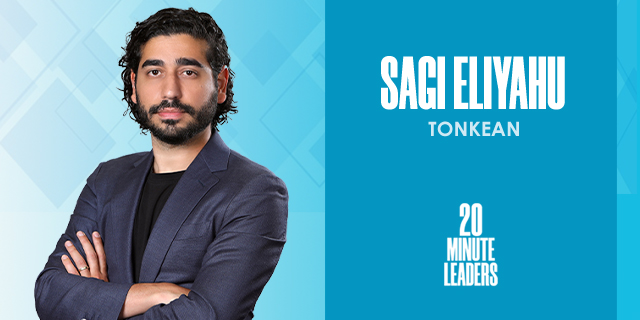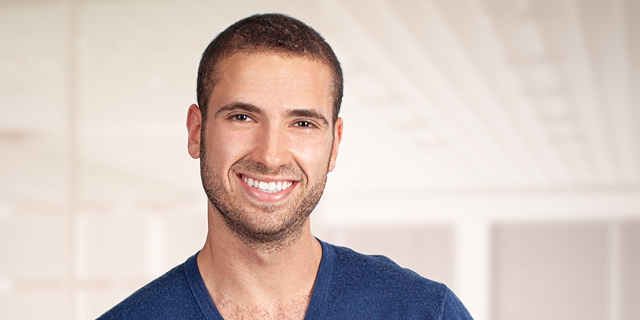
20-Minute Leaders
“If makers see a problem, they think, ‘Oh, I wonder how I can fix it.’"
As a tech leader, co-founder and CEO of Tonkean Sagi Eliyahu had the realization that software has been built for data and not how people work.
Click Here For More 20MinuteLeaders
Who is Sagi Eliyahu?I'm the CEO and founder of Tonkean. I'm a software guy at heart. I've been writing codes since I was 10 years old. I had the experience and the opportunity to grow as a leader and an executive in a public company before starting Tonkean. I'm very bullish about this space as well.
Take me back to six years ago. What were you observing?
There's a benefit to coming into a room for the first time where you look around and everything is new for you. That's kind of what happened to me. I was in the Army in Israel in the intelligence unit, then I joined a small startup that got acquired by a public tech company. I moved with this company here to the Bay Area. At that point, I had more than 300 people under me. I'm no longer engineering. But I was new to all of it. Every time I came to decision-making, I just felt like things are weird, strange, inefficient, or old in the way we do it.
I just felt like, honestly, there's a huge mismatch between the technology we have and what we need in order to run a business. I realized that business hypotheses that we all do all the time are not actually about data. They are about people. But a hundred percent of software in the organization is about data. The things we've built are not built for how people work. So I joined forces with my co-founder and started Tonkean.
So you're thinking, "How in the world am I going to change the way businesses are run from the inside?" How do you even begin to rationalize through what type of product you can build?
It's hard. It took three years for us to really have a breakthrough. Three years ago is really when things started to rapidly turn for us. The first three years are a combination of that sort of trial and error and trying to better understand where the market is currently. That concept of "not every problem should be solved necessarily with buying an off-the-shelf product" is also something that sort of grew as a market side by side with our personal growth as a company. It really sort of met in the middle about three years ago.
When you're approaching companies and you're talking about the way processes run, how receptive are they?
I think it comes down to two things. One, the priority for companies to invest in improving operations, that's almost like a culture shift. And COVID is terrible. But from a prioritization stand, it was actually a very inducive moment. Change is, all of a sudden, not a theoretical thing that you need to be afraid of. It was an immediate thing that you have to adapt to. And if you don't, you die. All of a sudden, companies that never had the operational efficiency or operational excellence in their top three company-wide initiatives now make it a top goal.
Then the second thing is what does it mean to change, to up level your operation in the way you leverage technology for it?
Nothing ever happens in a silo. It's a movement. Ten years ago, you had roles like developer operations, DevOps, and sales operations: basically, the only type of operations you had. Today, every department has an operation team. That's part of that understanding that you need to have people think about how they are going to improve the operation or the processes as a full-time job.
What is the technology, what is the methodology that is available for them to actually iterate? You can think about what we're trying to bring to customers from our product and our capabilities as similar to the invention of the assembly line on a factory floor. The industrial revolution literally started from that simple concept of: we need to orchestrate the work, not only execute the work better, but the way we actually move the work around the factory floor needs to be orchestrated.
That's what we're trying to bring to businesses, to enable those operation teams to build their own custom solutions without writing any code. It's a basic simple concept of, "Hey, take the parts that you already have and think about them as Lego blocks and build your own solution with those blocks that fits your need perfectly so you can actually now start to optimize it and iterate on it."
What is that process like, either from a technological perspective or from a business perspective?
It actually comes down to that composable approach. It's not only the technical part of the software, it's the mental concept of it, the ability to have built whatever you need. In the digital world that we live in, software is a superpower. You can build whatever you want. Do you know what the percentage of people who can code in the world is?
I would go with 0.1%.
Not far. Less than half a percent. Point four.
And the people that can actually build things, figure out problems, find solutions: I call those type of people "makers." If they see a problem, they're like, "Oh, I wonder how I can fix it."
This is not statistically accurate, but there's got to be at least 10% of the population that are makers. Because otherwise we won't survive. Right?
Being a maker is not a professional trait; this is a personal characteristic of the way we approach problems and solutions. Right?
Exactly. The only difference between a maker and a coder in this example is the skillset and the rules that they have in order to bring solutions to life. They already have the personality and the capability to do it. What technology really does is empower people that don't have the power and reduce that skills gap for people who already have those personal traits.
When I think about businesses and how businesses run, they're not leveraging technology. We're literally using 0.4% of the potential of what we can do with technology. The way there is not just shoving the more software and more apps down the company throat; it's the opposite. It's enabling and empowering more people who have the role to improve the processes. But they cannot code. How can I empower them to build custom solutions? Because that's kind of where it all comes down to, in my mind, and why we're excited about what we're doing.
If you make something that allows people to do things better, you impact the world in a linear way. If you allow more people to do things better, then your impact becomes exponential. We're trying to create a movement and trying to instill that concept of iterative approach, literally agile approach, to how you run the business. To do that, you need a framework and architecture that allows you to do that. It all comes back to that very basic concept of: we need to empower more people to leverage software.
You're actually saying, "We're actually misusing the potential of the people that are around us and the potential of people in the company and what they could do as makers." This is going to leave me with a lot of thoughts.
I'll leave you with a last quote that I just love from Picasso: "Computers are dumb. They can only answer questions." I think the point is, the hard part is asking the questions. Our part is something that only us creative people can do.
Michael Matias, Forbes 30 Under 30, is the author of Age is Only an Int: Lessons I Learned as a Young Entrepreneur. He studies Artificial Intelligence at Stanford University, is a Venture Partner at J-Ventures and was an engineer at Hippo Insurance. Matias previously served as an officer in the 8200 unit. 20MinuteLeaders is a tech entrepreneurship interview series featuring one-on-one interviews with fascinating founders, innovators and thought leaders sharing their journeys and experiences.
Contributing editors: Michael Matias, Megan Ryan
